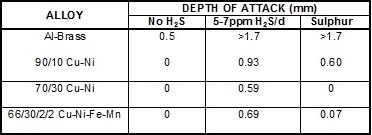Sulphur and Sulphides
It is well known that the corrosion of copper alloys in aerated seawater is greatly accelerated when small amounts of sulphide (eg cysteine or hydrogen sulphide) are also present. As little as 0.02 mg/L sulphide can greatly increase corrosion and cause rapid failure of heat exchanger tubes.
However, if the seawater feed lines are long (> 100m) the dissolved oxygen in the seawater reacts with the sulphide to form elemental sulphur. This is less aggressive to copper alloys compared with sulphide although the reduction in severity varies with alloy, as shown in the table below. This data was generated at BNF Metals Research Association in the 1950s but was never published in the open literature.
Depth of Impingement Attack in Seawater using the BNF Jet Test at 5m/s and 20°C

Posted on: 7th May 2017

